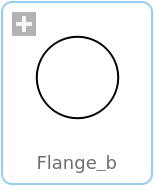WOLFRAM SYSTEM MODELER
Flange_bOne-dimensional rotational flange of a shaft (non-filled circle icon) |
|
Wolfram Language

SystemModel["Modelica.Mechanics.Rotational.Interfaces.Flange_b"]

Information
This information is part of the Modelica Standard Library maintained by the Modelica Association.
This is a connector for 1-dim. rotational mechanical systems and models which represents a mechanical flange of a shaft. The following variables are defined in this connector:
phi: Absolute rotation angle of the shaft flange in [rad]. tau: Cut-torque in the shaft flange in [Nm].
There is a second connector for flanges: Flange_a. The connectors Flange_a and Flange_b are completely identical. There is only a difference in the icons, in order to easier identify a flange variable in a diagram. For a discussion on the actual direction of the cut-torque tau and of the rotation angle, see section Sign Conventions in the user's guide of Rotational.
If needed, the absolute angular velocity w and the absolute angular acceleration a of the flange can be determined by differentiation of the flange angle phi:
w = der(phi); a = der(w);
Connector Variables (1)
| phi |
Causality: None Type: Angle (rad) Description: Absolute rotation angle of flange |
|---|
Flow Variables (1)
| tau |
Type: Torque (N⋅m) Description: Cut torque in the flange |
|---|
Used in Components (30)
|
Modelica.Blocks.Examples.Noise.Utilities.Parts Synchronous machine with current controller and measurement noise |
|
|
Modelica.Clocked.Examples.Systems.Utilities.ComponentsThrottleControl Internal combustion engine. |
|
|
Modelica.Electrical.Analog.Basic Electromotoric force (electric/mechanic transformer) |
|
|
Modelica.Mechanics.MultiBody.Examples.Loops.Utilities V6 engine with analytic loop handling |
|
|
Modelica.Mechanics.MultiBody.Examples.Systems.RobotR3.Utilities Motor model including current controller of r3 motors |
|
|
Modelica.Mechanics.MultiBody.Examples.Systems.RobotR3.Utilities Axis model of the r3 joints 4,5,6 |
|
|
Modelica.Mechanics.MultiBody.Interfaces Adaptor to allow direct connections to the sub-connectors of FlangeWithBearing |
|
|
Modelica.Mechanics.MultiBody.Joints Revolute joint (1 rotational degree-of-freedom, 2 potential states, optional axis flange) |
|
|
Modelica.Mechanics.MultiBody.Joints Joint (no mass, no inertia) that describes an ideal rolling wheel set (two ideal rolling wheels connected together by an axis) |
|
|
Modelica.Mechanics.MultiBody.Joints.Assemblies Universal - spherical - revolute joint aggregation (no constraints, no potential states) |
|
|
Modelica.Mechanics.MultiBody.Joints.Assemblies Spherical - spherical - revolute joint aggregation with mass (no constraints, no potential states) |
|
|
Modelica.Mechanics.MultiBody.Joints.Assemblies Planar revolute - revolute - revolute joint aggregation (no constraints, no potential states) |
|
|
Modelica.Mechanics.MultiBody.Joints.Internal Revolute joint where the rotation angle is computed from a length constraint (1 degree-of-freedom, no potential state) |
|
|
Modelica.Mechanics.MultiBody.Parts Propagate 1-dim. support torque to 3-dim. system (provided world.driveTrainMechanics3D=true) |
|
|
Modelica.Mechanics.MultiBody.Parts 1D inertia attachable on 3-dim. bodies (3D dynamic effects are taken into account if world.driveTrainMechanics3D=true) |
|
|
Modelica.Mechanics.MultiBody.Parts.Rotor1D 1D inertia attachable on 3-dim. bodies (3D dynamic effects are taken into account) |
|
|
Modelica.Mechanics.MultiBody.Parts Ideal rolling wheel set consisting of two ideal rolling wheels connected together by an axis |
|
|
Modelica.Mechanics.Rotational.Components Flange fixed in housing at a given angle |
|
|
Modelica.Mechanics.Rotational.Components Ideal planetary gear box |
|
|
Modelica.Mechanics.Rotational.Components Initializes a flange with pre-defined angle, speed and angular acceleration (usually, this is reference data from a control bus) |
|
|
Modelica.Mechanics.Rotational.Components Signal adaptor for a Rotational flange with torque as output and angle, speed, and optionally acceleration as inputs (especially useful for FMUs) |
|
|
Modelica.Mechanics.Rotational.Components Signal adaptor for a rotational flange with torque as output and angle, speed and acceleration as input (especially useful for FMUs) |
|
|
Modelica.Mechanics.Rotational.Interfaces Partial model for a component with two rotational 1-dim. shaft flanges |
|
|
Modelica.Mechanics.Rotational.Interfaces Partial model for a component with one rotational 1-dim. shaft flange and a support used for graphical modeling, i.e., the model is build up by drag-and-drop from elementary components |
|
|
Modelica.Mechanics.Rotational.Interfaces Partial model for a component with two rotational 1-dim. shaft flanges and a support used for graphical modeling, i.e., the model is build up by drag-and-drop from elementary components |
|
|
Modelica.Mechanics.Rotational.Interfaces Partial model for the compliant connection of two rotational 1-dim. shaft flanges |
|
|
PartialCompliantWithRelativeStates Modelica.Mechanics.Rotational.Interfaces Partial model for the compliant connection of two rotational 1-dim. shaft flanges where the relative angle and speed are used as preferred states |
|
|
PartialElementaryOneFlangeAndSupport2 Modelica.Mechanics.Rotational.Interfaces Partial model for a component with one rotational 1-dim. shaft flange and a support used for textual modeling, i.e., for elementary models |
|
|
PartialElementaryTwoFlangesAndSupport2 Modelica.Mechanics.Rotational.Interfaces Partial model for a component with two rotational 1-dim. shaft flanges and a support used for textual modeling, i.e., for elementary models |
|
|
Modelica.Mechanics.Rotational.Interfaces Partial model to measure a single relative variable between two flanges |
